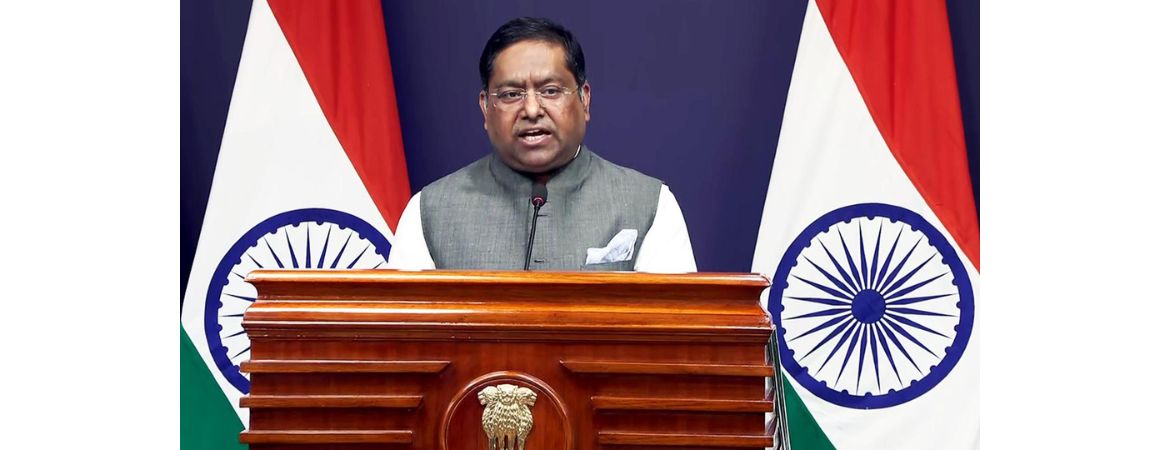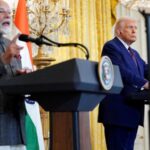After The Hague-based Court of Arbitration held that the abeyance of the Indus Waters Treaty was “unilateral”, Pakistan’s Army Chief and its Prime Minister issued threats of war against India; the MEA termed the rhetoric “reckless” and “hateful”; India said it “has never accepted the legality, legitimacy, or competence” of the CoA
India on Thursday (August 14, 2025) hit out at the Pakistani leadership for “reckless warmongering and hateful comments” as well as The Hague-based Court of Arbitration (CoA) for questioning India’s decision to suspend the Indus Waters Treaty (IWT) after the Pahalgam terror attack.
Responding to questions at the weekly briefing of the Ministry of External Affairs (MEA), the spokesperson said that Pakistan would face “painful consequences”, referring to Operation Sindoor, if it attempts any “misadventures”.
In two orders on June 27 and August 8, the World Bank-appointed CoA, which India has refused to recognise and boycotted hearings of, held that the treaty can only be terminated with the “mutual consent of India and Pakistan”. The orders were touted by Pakistan’s government as a victory, and amidst a number of other statements demanding that India restore the treaty, signed in 1960, Pakistan’s Army Chief Field Marshal Asim Munir had threatened to “blow up dams”, and “take down half the world”, seen as a nuclear threat.
Pakistan Prime Minister Shahbaz Sharif and Opposition leader Bilawal Bhutto too issued statements warning of reprisals if India held back the Indus waters.
“Pakistan would be well-advised to temper its rhetoric as any misadventure will have painful consequences as was demonstrated recently,” MEA spokesperson Randhir Jaiswal said during the briefing, calling the comments an attempt to “whip up anti-India rhetoric time and again to hide their own failures”.
The government reiterated its stand against the CoA, set up by the World Bank in 2016 on Pakistan’s request to discuss its objections to two hydropower projects, and was followed by the appointment of a neutral expert, as India requested. Both processes were then paused for about six years, but as India and Pakistan failed to resolve their issues bilaterally, those were put into motion in 2022.
“India has never accepted the legality, legitimacy, or competence of the so-called Court of Arbitration. Its pronouncements are therefore without jurisdiction, devoid of legal standing, and have no bearing on India’s rights of utilisation of waters,” Mr. Jaiswal said.
The latest orders by the CoA, that is headed by U.S. Professor Sean D. Murphy, and includes experts from Australia, Belgium and Jordan on the panel, came after the court took cognisance of India’s April 23 decision following the Pahalgam attack to put the IWT in abeyance. While the government had allowed a team of Pakistan’s water commissioners to visit Jammu & Kashmir in June last year, it decided to stop all such visits in September 2024, as it pursues the renegotiation of the IWT. After the Pahalgam attacks in which 26 men were gunned down by terrorists, India said it was suspending the treaty entirely in view of “Pakistan’s continued sponsorship of cross-border terrorism, including the barbaric Pahalgam attack”, Mr. Jaiswal repeated on Thursday.
In its orders, the CoA said that India had not responded to its “Procedural Order No. 15” asking for written submissions, and ruled again that it had the “competence” to hear Pakistan’s submissions.
“The Court found that the terms of the Treaty do not allow either Party, acting unilaterally, to hold in abeyance or suspend an ongoing dispute settlement process,” the CoA said, adding that events like the Pahalgam attack, “occurring after the initiation of proceedings can have no effect on the jurisdiction of the relevant court or tribunal”.
The MEA had termed the orders a “charade at Pakistan’s behest” calling Pakistan’s support for the CoA mechanism “consistent with its decades-long pattern of deception and manipulation of international forums”.
India slams Pakistan for warmongering, hateful comments
After The Hague-based Court of Arbitration held that the abeyance of the Indus Waters Treaty was “unilateral”, Pakistan’s Army Chief and its Prime Minister issued threats of war against India; the MEA termed the rhetoric “reckless” and “hateful”; India said it “has never accepted the legality, legitimacy, or competence” of the CoA
India on Thursday (August 14, 2025) hit out at the Pakistani leadership for “reckless warmongering and hateful comments” as well as The Hague-based Court of Arbitration (CoA) for questioning India’s decision to suspend the Indus Waters Treaty (IWT) after the Pahalgam terror attack.
Responding to questions at the weekly briefing of the Ministry of External Affairs (MEA), the spokesperson said that Pakistan would face “painful consequences”, referring to Operation Sindoor, if it attempts any “misadventures”.
In two orders on June 27 and August 8, the World Bank-appointed CoA, which India has refused to recognise and boycotted hearings of, held that the treaty can only be terminated with the “mutual consent of India and Pakistan”. The orders were touted by Pakistan’s government as a victory, and amidst a number of other statements demanding that India restore the treaty, signed in 1960, Pakistan’s Army Chief Field Marshal Asim Munir had threatened to “blow up dams”, and “take down half the world”, seen as a nuclear threat.
Pakistan Prime Minister Shahbaz Sharif and Opposition leader Bilawal Bhutto too issued statements warning of reprisals if India held back the Indus waters.
“Pakistan would be well-advised to temper its rhetoric as any misadventure will have painful consequences as was demonstrated recently,” MEA spokesperson Randhir Jaiswal said during the briefing, calling the comments an attempt to “whip up anti-India rhetoric time and again to hide their own failures”.
The government reiterated its stand against the CoA, set up by the World Bank in 2016 on Pakistan’s request to discuss its objections to two hydropower projects, and was followed by the appointment of a neutral expert, as India requested. Both processes were then paused for about six years, but as India and Pakistan failed to resolve their issues bilaterally, those were put into motion in 2022.
“India has never accepted the legality, legitimacy, or competence of the so-called Court of Arbitration. Its pronouncements are therefore without jurisdiction, devoid of legal standing, and have no bearing on India’s rights of utilisation of waters,” Mr. Jaiswal said.
The latest orders by the CoA, that is headed by U.S. Professor Sean D. Murphy, and includes experts from Australia, Belgium and Jordan on the panel, came after the court took cognisance of India’s April 23 decision following the Pahalgam attack to put the IWT in abeyance. While the government had allowed a team of Pakistan’s water commissioners to visit Jammu & Kashmir in June last year, it decided to stop all such visits in September 2024, as it pursues the renegotiation of the IWT. After the Pahalgam attacks in which 26 men were gunned down by terrorists, India said it was suspending the treaty entirely in view of “Pakistan’s continued sponsorship of cross-border terrorism, including the barbaric Pahalgam attack”, Mr. Jaiswal repeated on Thursday.
In its orders, the CoA said that India had not responded to its “Procedural Order No. 15” asking for written submissions, and ruled again that it had the “competence” to hear Pakistan’s submissions.
“The Court found that the terms of the Treaty do not allow either Party, acting unilaterally, to hold in abeyance or suspend an ongoing dispute settlement process,” the CoA said, adding that events like the Pahalgam attack, “occurring after the initiation of proceedings can have no effect on the jurisdiction of the relevant court or tribunal”.
The MEA had termed the orders a “charade at Pakistan’s behest” calling Pakistan’s support for the CoA mechanism “consistent with its decades-long pattern of deception and manipulation of international forums”.






NO COMMENT